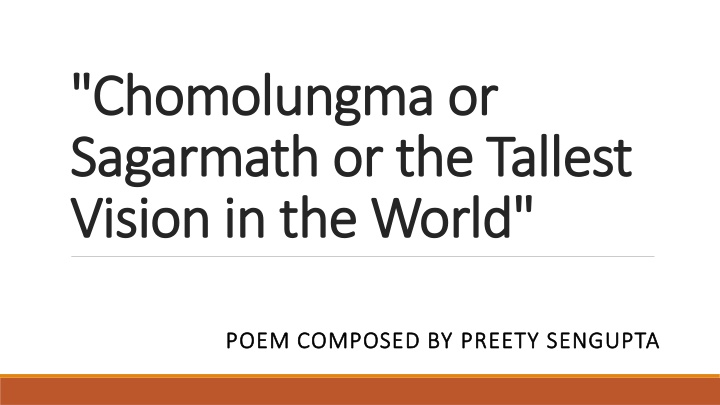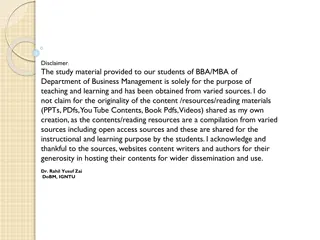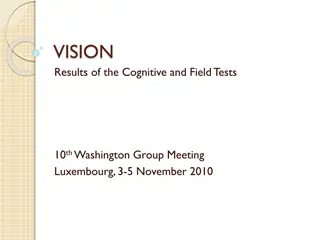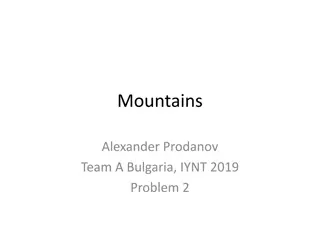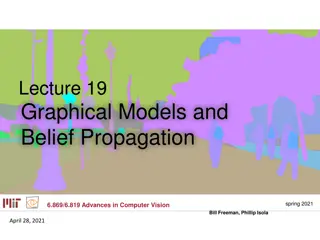Chomolungma: The Tallest Vision in the World
The poet, Preety Sengupta, marvels at the grandeur of Mt. Everest, also known as Chomolungma and Sagarmath, in a travel poem that captures the awe-inspiring sight and profound emotions evoked by the tallest mountain. Through vivid imagery and personal reflections, she conveys a sense of surrender and magnanimity in the presence of this natural wonder, symbolizing the essence of human connection with nature's grandeur.
Download Presentation

Please find below an Image/Link to download the presentation.
The content on the website is provided AS IS for your information and personal use only. It may not be sold, licensed, or shared on other websites without obtaining consent from the author.If you encounter any issues during the download, it is possible that the publisher has removed the file from their server.
You are allowed to download the files provided on this website for personal or commercial use, subject to the condition that they are used lawfully. All files are the property of their respective owners.
The content on the website is provided AS IS for your information and personal use only. It may not be sold, licensed, or shared on other websites without obtaining consent from the author.
E N D
Presentation Transcript
"Chomolungma or "Chomolungma or Sagarmath Sagarmathor the Tallest or the Tallest Vision in the World" Vision in the World" POEM COMPOSED BY POEM COMPOSED BY PREETY PREETY SENGUPTA SENGUPTA
"Chomolungma or "Chomolungma or Sagarmath Tallest Vision in the World" Tallest Vision in the World" Sagarmathor the or the Awed and blessed at once I forget to blink as if the mountain will move away. It has risen to claim the sky completely the tallest vision in the world, and yet do I dare to confess my heart seems to soar higher. It is close to memassive; I am close to itsubmissive face after face is revealed, most our overlapping folds are flung open. We see what truly is. My breath is taken away, and I am most alive. I stretch my arms, and my desire is fulfilled. Contd. on next slide
"Chomolungma or "Chomolungma or Sagarmath Tallest Vision in the World" Tallest Vision in the World" Sagarmathor the or the The body of the soul melts like snow in summer. Rivers flow bearing reflections of the High Priest the sharp peak above, the one that is mine, mine own, mine alone. Upon seeing the Everest, up close, from Tibet. Author: Preety Sengupta Source: Indian Literature, Vol. 47, No. 6 (218) (Nov-Dec 2003), p. 20Published by: Sahitya Akademi
About the Poet About the Poet Preety Sengupta is an Indian diasporic writer She was born in Gujarat in May 1948 and moved to the US and Canada after her marriage An avid traveller, she has visited over 117 countries across the world Her poem on Everest is a travel poem
A Travel Poem A Travel Poem The Tibetans call Mt. Everest, Chomulangma, meaning Goddess Mother of the World The Nepalese call it Sagarmath, meaning Peak of Heaven Thus, the title carries three names and is a clear indication to the reader that it will look at the subject with three different perspectives At first sight, the poet describes her feelings on viewing Mt. Everest, the tallest mountain in the world : Awe and blessing Delighted and overwhelmed: worried that if she blinks, the mountain will walk away! It seems to her as if the mountain has covered the whole sky: it is all she can see in her vision Her heart is equally filled with her vision of the tallest mountain in the world and she feels magnanimous, surrendering herself to the massive mountain
The Tallest Vision The Tallest Vision The view is so enthralling that the poet believes it is only now, in viewing Everest that she has truly experienced and lived her life to the fullest She stretches her arms to try and reach the peak and hold it in her hands or is she surrendering herself to the mountain? The poet feels as if her soul is melting like the snow in summer her entire being, complete with her identity, her beliefs, her thoughts are all flowing out like a river In her surrender, she has melted and become one with God He is reflected in her as the High Priest
Poetic Devices Poetic Devices Narrative Poem in Free Verse Nature-based Poem Exclamatory tone of voice Imagery is very vivid Polysyndeton : The word or is used multiple times in the Title Juxtaposition : In the first line Awed and blessed at once Shows Two contradictory emotions Hyperbole : I have risen to claim the sky Simile : soul melts like snow in summer Tautology : It is close to me massive; I am close to it submissive Isocolon: Repetition of the word mine in the same sentence: mine, mine own, mine alone Contradiction : My breath is taken away and I am most alive Symbolism : High Priest symbolizes God and is used in place of Mountain Personification : As if the mountain will move away Anastrophe : body of the soul Allusion: Sagarmatha as an elixir of life
